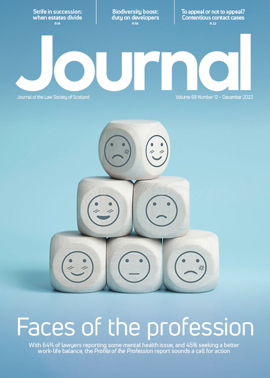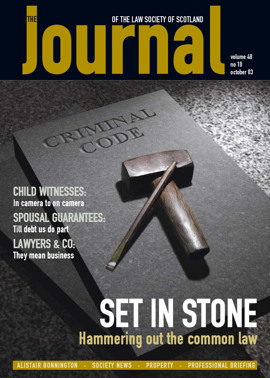Taking care of child cases

“It is easier to change rules of court than to change a prevailing culture.” So said Lord Reed in his concluding remarks in B v G [2012] UKSC 21 (23 May 2012), the final stage of a child residence and contact case that began in 2004, occupied some 52 court days at proof stage alone and cost around £1 million, mostly in legal aid.
But culture change was what he sought, to avoid similar cases in future, and the challenge was taken up in a half-day seminar on 31 August. Co-hosted by the Scottish Child Law Centre and Murray Stable, and chaired by Janys Scott QC, an eight-strong expert panel in turn offered their three steps to achieving culture change – with a deal of audience discussion along the way.
Lord Reed’s strictures, and his observation that such protracted proceedings were not uncommon, did not go unchallenged. Ross Macfarlane, family law advocate, protested that he had only been in one such case in 20 years of practice, and that family lawyers dedicated themselves to dealing with social breakdown when they could be making more money in other fields.
And Graham Harding, chair of the Family Law Association, pointed out that members are required to adhere to the core principle of trying to resolve matters rather than inflame them.
It was recognised, however, that difficulties can and do arise, perhaps especially when non-specialist practitioners become involved, and that current court procedures do not lend themselves to keeping control of a litigation which the parties are determined to pursue with full vigour.
Would it work to require all family law cases to be litigated by accredited specialists – or at least those with particular training? That was one of Macfarlane’s three points, along with equivalent specialisation on the shrieval bench. But how likely is that, when the Gill review would move much family law work to the recommended new lower tier of summary sheriffs? And what about finding a legal aid lawyer?
Morag Driscoll, Director of the Scottish Child Law Centre, pointed out that there are many very good practitioners who are not accredited. She took a somewhat different line, calling for training of lawyers, sheriffs, curators and bar reporters in how to undertake “ethical consultation” with children in the context of the legal process; and on the impact on children of family breakup, parental hostility etc. Contact issues are the biggest single source of calls to the Centre, she said, and can be very messy.
Curators v reporters
Bar reporters and curators featured strongly in the session, partly in light of the call in B v G for greater clarity over the role of the curator. Ian Maxwell of Families Need Fathers made a plea for recognised standards for bar reports, and training for reporters. Most of them are good at their job, he said, but there are exceptions who act in a partial manner and it is difficult to challenge a report’s conclusions. His organisation has just published a “User’s Guide to Bar Reports” (see panel) which sets out some of these issues. Graham Harding, speaking as a curator, said the Family Law Association had been pressing for mandatory training of curators, and the Government was “looking at it”.
Is it better to have a curator or a bar reporter? There were several comments that practice appears to be quite random from one sheriff court district to the next, with some courts habitually taking one line and others the contrary. Some speakers from the floor favoured instructing a bar report at an early stage, as it would help in the determination of a case, and one questioned why curators are needed when the sheriff is obliged to consider the child’s interests. Harding suggested that a curator was able to act throughout a case that might come before different sheriffs. But Driscoll knew of a case where a curator had remained in post for three years despite the child refusing to meet them.
For the Scottish Legal Aid Board, Catriona Whyte also questioned whether we really need curators/reporters. Last year £4.8 million was paid by SLAB in reporters’ fees, and the length and cost of reports can vary enormously (she supported having clear parameters for reporters). It was always the legally aided party who was made responsible for the report – was the same approach adopted in privately funded cases?
It is a feature of the most contentious cases that they are generally legally aided, and Whyte called attention to the “fundamental lack of private client reality” in publicly funded cases. The cost goes up by more than £1,000 per party if both are legally aided, she stated. We don’t want to see the removal of funding from family cases as is happening in England, but we need ways of controlling the cost.
SLAB will be monitoring case progress more closely in future, including stage reports, and solicitors can expect to hear from them if the cost goes much into five figures.
Management priority
What about the actual court process? Stephen Brand, a family law solicitor on the Sheriff Court Rules Council, put forward as his three points: the introduction of case management hearings (which need to involve the principal agents); an allocation of time to finish a case once proof has started, preferably on consecutive days; and a radical simplification of pleadings.
Sheriff Frank Crowe, for the bench, added a number of points to assist in avoiding delay, in preparing for proof, and in conducting the proof. He regarded case management as crucial, along with shrieval continuity; encouraged parties wherever possible to lead impartial witnesses and produce expert reports; and called for parties to avoid “last minute ambushes” at proof, and for sheriffs to be ready to be proactive and “move parties on”.
This echoed another point made earlier by Graham Harding, for whom case management meant early intervention from the bench to identify the real issues and how to address them, setting out for parties what would – and would not – happen in the case, “encouraging or threatening as necessary”. No doubt SLAB would approve.
Speaking for the child
The child’s perspective was not overlooked, and Morag Driscoll would have children represented where the child has capacity and wishes to instruct – this not dependent on the parents’ finances. “If grown-ups are not close to taking a decision for the benefit of the child, we must give the child a voice”, she maintained. And we must focus on the individual child rather than rely on general assertions, such as “Having a view is tantamount to having to choose”, or “Forcing the refusing child can solve the problem”.
A tricky one, that last point. Ian Maxwell (Families Need Fathers) pointed to research findings that 30 out of 58 children had a positive experience of contact after initially not wanting it – which leaves about half who didn’t. His point was that on the fundamental question of residence, children should be consulted but are not the decision makers. “We don’t let them decide whether to go to school”, he commented, “so we shouldn’t let them decide whether to see their parents.”
An audience member from a children’s organisation suggested that the courts learn from the children’s hearing system, where giving the child a voice is at the heart of what the hearing does.
Detecting abuse
Louise Johnson of Scottish Women’s Aid sounded a warning note over cases of domestic abuse. The presence of abuse, she said, was often disregarded with the increased emphasis on mediation, though abuse was not a “dispute” capable of being mediated, and on shared parenting, where the arrangements might not be adequately risk assessed or monitored.
Although contact has to be in the interests of the child, her organisation has heard of cases where there appeared to be a presumption applied that contact was appropriate. When children say they want contact, this goes unchallenged, but not when they say they don’t – why? There is a training point again here, to raise awareness of the issues and of the possible signs of abuse. The courts, she concluded, must not lose the confidence of those they are supposed to be protecting.
Full circle
Returning to Ross Macfarlane, and a point also made in the open session – there should be a means of following up a court decision once made, to see whether it is working. The court process stops, legal aid stops – but what if the contact ordered isn’t happening?
Many constructive points were made, and although the seminar was not designed to produce a consensus on the way forward, training in its various guises, along with greater control of the progress of a case, were recurring themes. We can expect to hear more on this.
FNF publishes bar reports “user’s guide”
A “user’s guide” to bar reports in Scotland has been published by Families Need Fathers (FNF), the organisation that works to maintain contact between children and non-resident parents following their parents’ separation.
Recommendations in bar reports are often relied on by a court in reaching a decision on residence or contact. But, says FNF, there is no clear information available to the parties or their children setting out what the reporter’s powers and duties are, or how they should go about their work.
The purpose of the guide is to make the process “more transparent and accessible” to those involved in child contact actions, rather than coaching parents through how to get a favourable bar report. But, FNF adds, “being better informed, it may help them represent their interests and the realities of the relationship with their children more effectively”.
The guide explains what bar reports are for, what happens at interview, who pays, what to expect in the report, and whether it can be challenged.
In this issue
- Players and winners
- Access to client money?
- Tax and residential property
- Trusts and the family business
- Planning: the next level
- Reading for pleasure
- Opinion: Tom Mullen/Alan Paterson
- Council profile
- Book reviews
- President's column
- Deed plan criteria
- Decision time for justice
- "Can do": can you?
- Taxes heading north
- When the agent answers
- Taking care of child cases
- Collective redress
- Making sense of hearsay rules
- Don't forget the register
- Alcohol: the healthy option
- Seeding scheme is a draw
- Scottish Solicitors' Discipline Tribunal
- Human trafficking: is the system responding?
- Power points and positive rights
- A way to apply yourself
- Society presents "ambitious plans"
- Law reform roundup
- Business benefits
- On the right track
- Ask Ash
- Business radar
- Legacies: the untapped potential
- Charity begins at law
- Love them and leave to them
- Those difficult relatives






